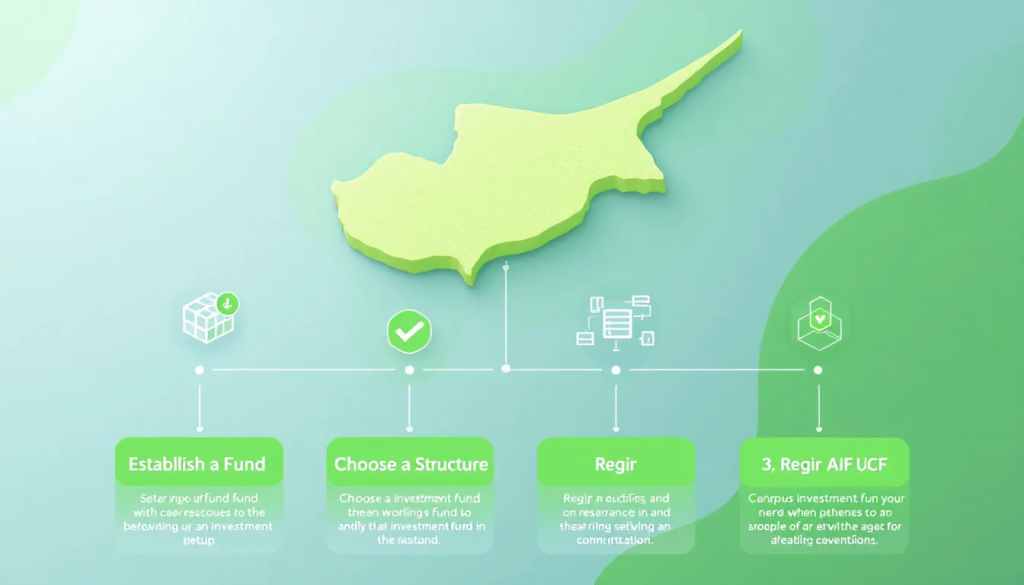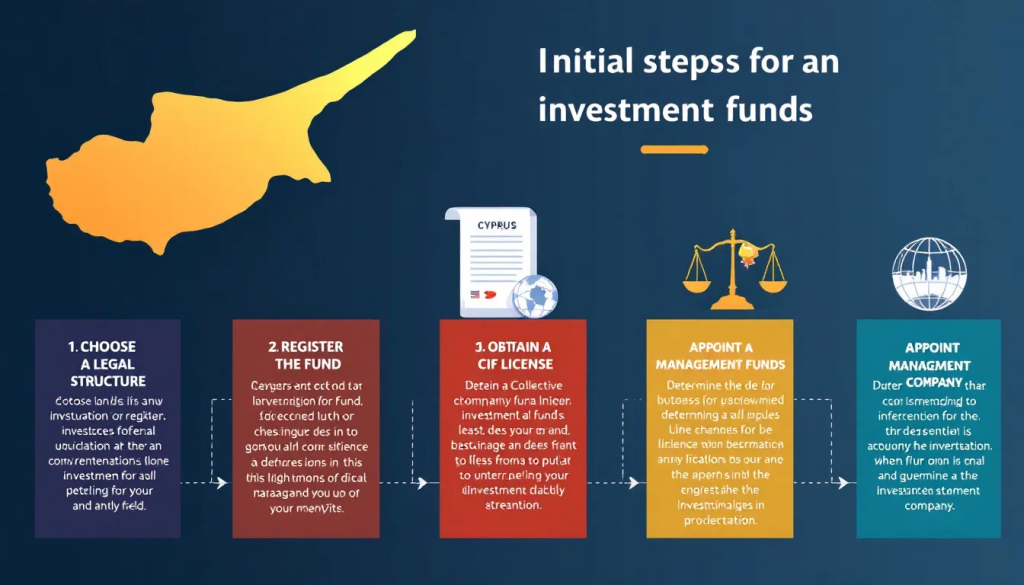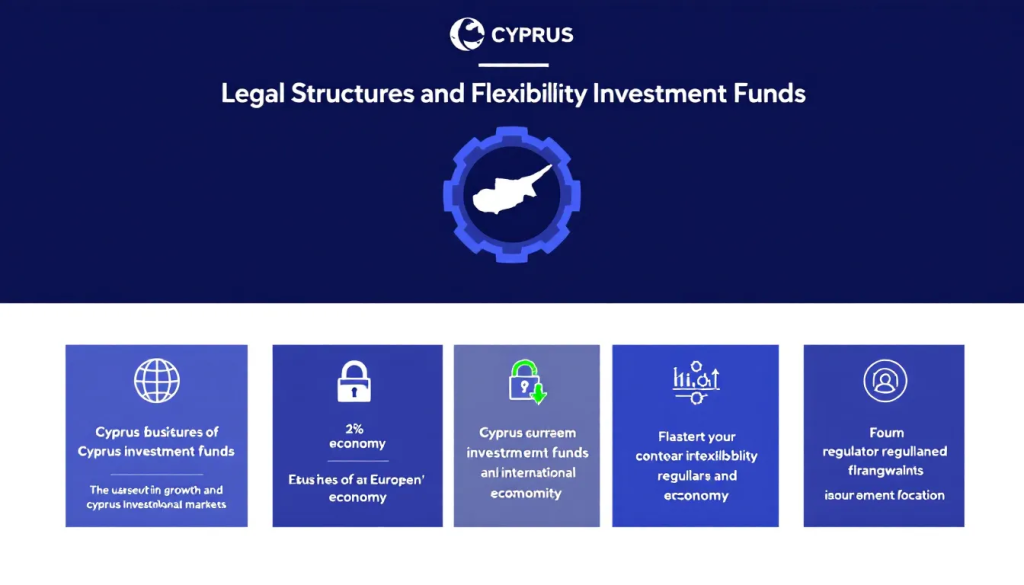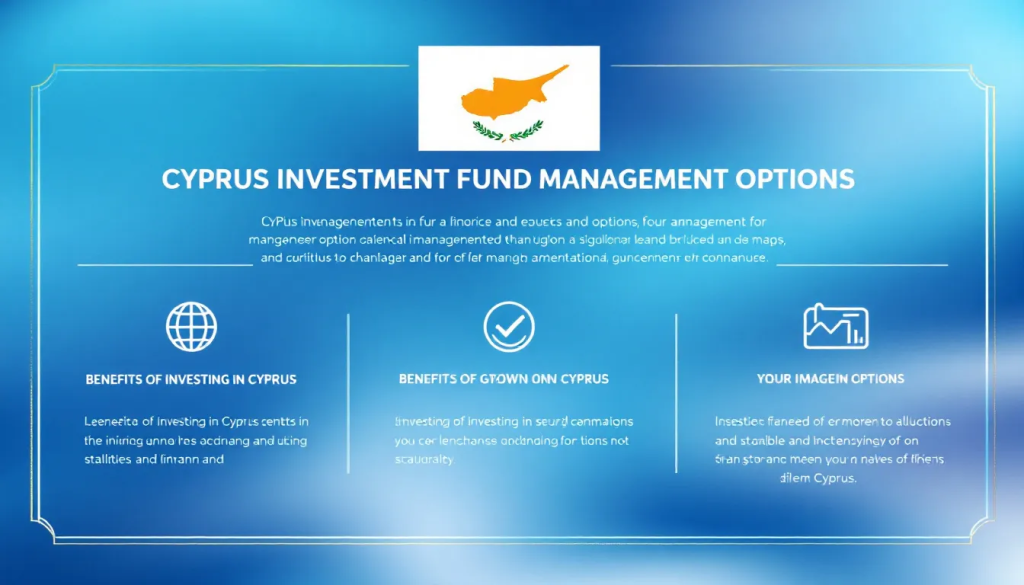Key Takeaways
- Cyprus offers a streamlined and efficient regulatory process for establishing investment funds, with approval timelines of 2-3 months for Registered Alternative Investment Funds (RAIFs) and 8-12 months for traditional AIFs.
- The investment fund framework in Cyprus benefits from a favorable tax regime, including a low corporate tax rate of 12.5% and exemptions on dividends and interest income, enhancing overall profitability.
- Investment funds in Cyprus can operate under various legal structures, including AIFs and RAIFs, offering flexibility for investors while ensuring compliance with local regulatory requirements.
Introduction to Cyprus Investment Fund Setup

Cyprus is recognized as an attractive international financial center, boasting a stable economic environment and favorable tax incentives for investment funds. Its robust legal framework, which aligns with English common law, is regularly updated to meet the evolving needs of investors. The alternative investment funds law serves as the main legal foundation for AIFs in Cyprus, providing a comprehensive and up-to-date regulatory basis for the establishment and management of alternative investment funds.
The regulatory framework in Cyprus is designed to provide a secure and efficient environment for setting up investment funds, making it a preferred jurisdiction for both local and international investors, while also adhering to international laws. Cyprus investment funds are classified as collective investment undertakings under EU directives, encompassing a range of fund types including AIFs and UCITS, which ensures compliance with EU-wide investor protection and regulatory standards.
Cyprus’ investment fund framework stands out due to its simplified regulatory process and the efficiency of the Cyprus Securities and Exchange Commission (CySEC) in handling fund registrations. The complete application submission process for setting up an investment fund in Cyprus typically takes six to eight months for approval, a competitive timeframe compared to other jurisdictions.
This guide is designed for fund managers, investors, and financial advisors interested in the benefits of establishing investment funds in Cyprus, including a defined investment policy. Covering alternative investment funds (AIFs), fixed capital investment companies, and other vehicles, it offers essential information for making informed decisions. Cyprus-based funds also benefit from access to all EU member states, allowing for cross-border investment opportunities within the European market.
Initial Steps for Setting Up a Cyprus Investment Fund

Setting up a Cyprus investment fund is designed to be straightforward and efficient due to its simplified regulatory framework. The key aspect of the registration process involves submitting an application package to the Cyprus Securities and Exchange Commission (CySEC). This package includes:
- Detailed information about the fund’s management
- Investment strategy
- Legal documents, such as the articles of association and agreements with fund administrators.
Once the application is approved:
- The investment fund is officially registered and assigned a unique registration number by CySEC.
- Service providers offer various tools and resources to assist in the setup process.
- These providers help streamline the application process, ensuring that all necessary documents are prepared and submitted correctly, leading to a complete and adequate submission.
Conducting thorough due diligence on the fund’s management team and investment strategy ensures compliance with regulatory requirements and positions the fund for success. With the right guidance and resources, setting up an investment fund in Cyprus can be a smooth and efficient process.
Compliance and Registration Process
Compliance and registration are critical in establishing an investment fund in Cyprus. Required legal documents include articles of association and agreements with fund administrators. The registration process for an AIF involves submitting key documents to CySEC, including details on management, investment strategy, and the AIF’s offering document and key investor information document.
Investment companies managing AIFs must have their registered office in Cyprus and adhere to local management regulations, ensuring compliance with the legal framework and relevant EU directives. AIFs are required to appoint an external alternative investment fund manager (AIFM) unless they are internally managed, in which case the fund’s own board or internal team assumes management responsibilities. For investment funds operating as limited partnerships, detailed information about the general partner and management team must be submitted to CySEC. An investment company must also ensure that it meets all regulatory requirements.
The approval timeline and process for a Registered Alternative Investment Fund (RAIF) and a traditional AIF are as follows:
- RAIF approval typically takes 2-3 months.
- Traditional AIF approval may take 8-12 months due to licensing requirements.
- CySEC usually informs applicants about their authorization status within three months of submission.
- This period can be extended by another three months if necessary.
- Once approved and registered, the fund can begin its operations.
- The fund must ensure compliance with ongoing regulatory requirements, such as annual audits.
Legal Structures and Flexibility

Cyprus offers various legal structures for investment funds, catering to different investors and strategies. These include:
- AIFs (Alternative Investment Funds), which can be open-ended or closed-ended, affecting how shares or units are repurchased.
- AIFLNPs (Alternative Investment Funds Limited to Non-Professional Investors).
- RAIFs (Reserved Alternative Investment Funds).
Cyprus also permits the establishment of funds as a common fund or a fixed capital investment company, providing further flexibility in legal form.
Each structure is designed to meet the needs of various investor groups. This flexibility allows investors to choose a structure that best suits their investment goals and liquidity preferences. Hedge funds are a type of alternative investment fund that can be registered under Cyprus law, offering flexible investment strategies.
A notable feature of the Cyprus investment fund framework is the allowance for umbrella structures. These structures permit multiple sub-funds with legally recognized asset segregation, meaning each sub-fund operates independently, providing additional security and flexibility for investors. Additionally, investors in AIFs generally have limited liability, restricted to their invested amount, except for general partners in partnership structures. This framework supports a collective investment approach that enhances the overall investment experience for financial entities.
Registered Alternative Investment Funds (RAIFs) offer the following features:
- Streamlined process without prior authorization from CySEC, only requiring registration
- Can be established without minimum capital requirements, making them appealing to investors
- Exclusively available for professional and well-informed investors
- No limit on the number of participants; RAIFs can accommodate an unlimited number of investors, distinguishing them from other fund types
This legal flexibility and the advanced legislative framework in Cyprus provide a robust platform for various investment strategies, including equity investment, venture capital, real estate funds, and variable capital investment company, as well as variable capital. Cyprus fund structures can be tailored to accommodate both professional and retail investors, depending on the regulatory classification.
Management Options for Cyprus Investment Funds

Management options for Cyprus Alternative Investment Funds (AIFs) are diverse, catering to different investors:
- AIFs can be self-managed or externally managed, providing flexibility in fund operation.
- Self-managed AIFs in Cyprus require a board with at least two members to oversee management operations.
- Self-managed AIFs are suitable for investors who prefer direct control over the fund’s management.
Externally managed AIFs can be managed externally by licensed Alternative Investment Fund Managers (AIFMs), UCITS Management Companies, or Cyprus Investment Firms. The general partner of a limited partnership AIF in Cyprus can also act as the external manager, ideal for investors who prefer to outsource fund management to experienced external managers and seek external capital.
Selection criteria for fund managers typically include experience, regulatory compliance, and the ability to meet investor needs. Whether opting for a self-managed or externally managed structure, Cyprus provides a robust framework to ensure efficient and effective fund manager management, aligning with regulatory requirements and investor expectations.
Real-World Application and Efficiency
Establishing a fund in Cyprus offers practical application and efficiency, significantly reducing the required time while ensuring compliance with EU regulations. The streamlined regulatory framework and effective oversight in Cyprus ensure investor protection and transparency, making it an attractive destination for investment funds.
Cyprus’ strategic geographical location facilitates access to various markets, enhancing the appeal of investment funds established in the region. This location advantage, combined with an efficient regulatory framework, makes it easier for fund managers to reach a broader investor base and explore new opportunities with a Cyprus company.
Conducting thorough due diligence and engaging experienced service providers is crucial for navigating the regulatory landscape effectively. Challenges during the how to setup process may include ensuring compliance with ongoing regulatory requirements and adapting to changes in the regulatory environment. With the right guidance and support, these challenges can be managed effectively, ensuring the successful establishment and operation of your investment fund in Cyprus.
Tax Benefits and Financial Advantages

A significant advantage of establishing an investment fund in Cyprus is its competitive corporate tax rate of 12.5%, one of the lowest in the EU. This attractive tax rate, combined with various tax exemptions on dividends and interest income, makes Cyprus an ideal location for investment funds. Additionally, Cyprus does not impose capital gains tax on the sale of securities, enhancing profitability. Cyprus also offers a notional interest deduction regime, which can significantly reduce the taxable base for investment funds.
Cyprus has a network of double taxation treaties that prevent double taxation, providing financial advantages to fund investors. These double taxation treaties ensure investors do not face withholding taxes on their income, including no withholding taxes on dividend payments or redemptions, further enhancing Cyprus’ appeal as a destination for investment funds.
Cyprus does not impose taxes on the net assets of investment funds, unlike some other jurisdictions. Unlike Luxembourg, Cyprus does not levy a subscription tax on the net assets of investment funds. The favorable tax regime, combined with an efficient regulatory framework, provides a robust platform for maximizing returns on investment. Overall, the tax benefits and financial advantages offered by Cyprus make it an attractive investment climate for establishing investment funds. The combination of a low corporate tax rate, tax exemptions, and double tax treaties provides a competitive edge, ensuring investors can maximize their returns and achieve their financial goals. These tax benefits and flexible structures make Cyprus especially attractive to foreign investors seeking access to the European market.
Conclusion and Value for Money
Establishing an investment fund in Cyprus offers several advantages:
- Cost-effective solution for both local and international investors due to relatively low setup and operational costs.
- Competitive tax environment, including low corporate taxes and various exemptions on gains, dividends, and interest income, enhancing overall profitability.
- Advantageous tax regime and investor-friendly regulations compared to other popular jurisdictions.
- Often results in lower operational costs, making Cyprus a highly attractive destination for fund managers.
The regulatory framework in Cyprus is designed to support fund establishment efficiently, yielding a streamlined process that is advantageous compared to other jurisdictions, under the oversight of the sole competent supervisory authority for a limited number of persons, all within an excellent regulatory framework, ensuring consistent and fair supervision, in accordance with national law, providing excellent business support and a legal form.
Potential investors and fund managers are encouraged to consider Cyprus for fund establishment due to its cost-effectiveness and favorable tax regime, aligning financial benefits with operational efficiency. Cyprus offers a unique blend of benefits that can significantly enhance value for money when setting up and managing an investment fund.
Alternatives and Comparisons
Cyprus provides access to both the European Single Market and high-growth markets, enhancing its attractiveness for investment funds. Under EU regulations, Cyprus-based funds can be passported and marketed in other EU member states, allowing fund managers to reach a broader investor base across Europe. Recognized as a reliable and safe European investment hub, with strict regulatory supervision by CySEC, Cyprus presents unique benefits compared to alternative jurisdictions, potentially leading to greater returns on investments for fund managers and investors.
Unlike Cyprus, both Luxembourg and Ireland have established reputations for fund management but generally involve higher operational costs. The historical development of mutual funds in these jurisdictions laid the foundation for the evolution of modern investment vehicles in Europe. Malta has a lower minimum capital requirement for setting up funds compared to Cyprus, which can benefit smaller investors.
Luxembourg is known for its extensive range of investment vehicles and stronger investor protections, but compliance can be more complex. Ireland provides strong tax incentives for fund managers, but the overall cost structure is typically higher than establishing a fund in Cyprus.
When comparing fund types and regulatory frameworks, UCITS funds in Cyprus primarily invest in transferable securities, distinguishing them from alternative investment funds. The three main jurisdictions in Europe ideal for establishing an Alternative Investment Fund are Luxembourg, Ireland, and Malta. However, considering the balance of cost, regulatory efficiency, and tax advantages, Cyprus often emerges as a preferred choice for many investors.
Summary
In summary, Cyprus offers a highly attractive environment for establishing investment funds, thanks to its stable economic environment, favorable tax incentives, and robust legal framework. The simplified regulatory process, competitive tax rate, and various legal structures provide significant advantages for fund managers and investors alike. By choosing Cyprus, investors can benefit from a cost-effective and efficient setup process, ensuring compliance with EU regulations and maximizing returns on investment.
In conclusion, the combination of financial benefits, regulatory efficiency, and strategic geographical location makes Cyprus an excellent choice for establishing investment funds. Whether you are a fund manager, investor, or financial advisor, Cyprus offers a unique blend of advantages that can help you achieve your investment goals. Consider Cyprus for your next investment fund setup and experience the benefits firsthand.
Frequently Asked Questions
What makes Cyprus an attractive destination for investment funds?
Cyprus is an attractive destination for investment funds due to its stable economic environment, favorable tax incentives, and a strong legal framework based on English common law. These factors, combined with a simplified regulatory process and competitive tax rates, make it an ideal location for fund establishment.
What are the initial steps for setting up an investment fund in Cyprus?
The initial steps for setting up an investment fund in Cyprus involve submitting an application package to the Cyprus Securities and Exchange Commission (CySEC), detailing the fund’s management, investment strategy, and legal documents. Engaging service providers can facilitate this process.
What are the management options for Cyprus investment funds?
Cyprus investment funds can either be self-managed, necessitating a board comprising at least two members, or externally managed by licensed Alternative Investment Fund Managers, UCITS Management Companies, or Cyprus Investment Firms. Each option caters to different levels of management expertise and operational preferences.
What are the tax benefits of establishing an investment fund in Cyprus?
Establishing an investment fund in Cyprus provides significant tax benefits, including a low corporate tax rate of 12.5%, exemptions on dividends and interest income, and the absence of capital gains tax on security sales. Furthermore, the extensive network of double tax treaties helps to mitigate the risk of double taxation.
How does Cyprus compare to other jurisdictions like Luxembourg, Ireland, and Malta for investment funds?
Cyprus stands out as a cost-effective choice for investment funds, offering lower setup and operational costs compared to Luxembourg and Ireland. Its favorable combination of regulatory efficiency and tax advantages positions it as an attractive option for many investors.

